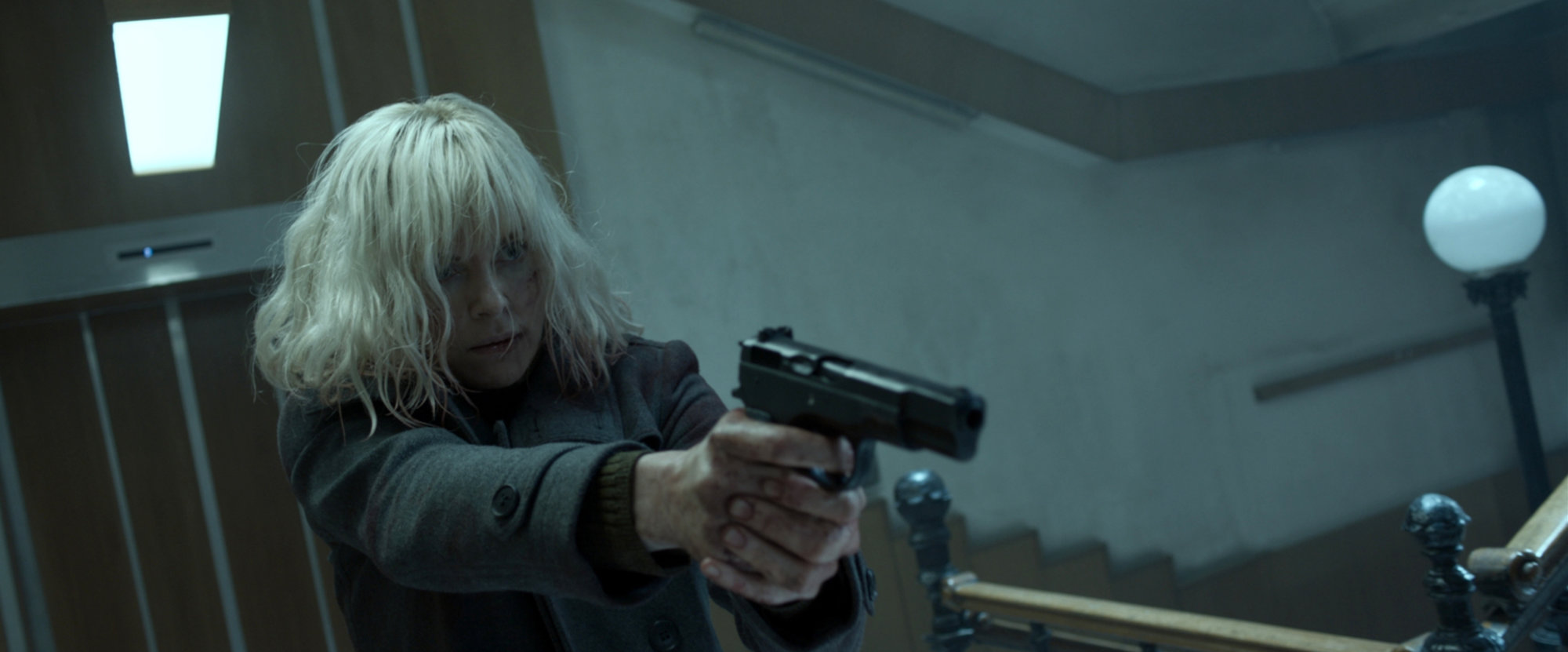 ★★★★½
★★★★½
“Truly a nuclear option.”
 Ladies and gentlemen, we have a new action queen in town. With Angelina Jolie apparently abdicating that title after Salt, the throne was vacant. Theron had already made a very solid case in Mad Max: Fury Road, then solidified it in The Huntsman: Winter’s War. But there were still doubts: could she hold the true focus of a genuinely action-driven film? There are doubts no more, for Atomic Blonde gives us Theron in the role of Lorraine Broughton, the baddest-ass heroine since The Bride in the first Kill Bill.
Ladies and gentlemen, we have a new action queen in town. With Angelina Jolie apparently abdicating that title after Salt, the throne was vacant. Theron had already made a very solid case in Mad Max: Fury Road, then solidified it in The Huntsman: Winter’s War. But there were still doubts: could she hold the true focus of a genuinely action-driven film? There are doubts no more, for Atomic Blonde gives us Theron in the role of Lorraine Broughton, the baddest-ass heroine since The Bride in the first Kill Bill.
She’s an agent of British intelligence, sent to Berlin in the very last days of the Communist regime. Her mission is to retrieve a list which details the identities of every Soviet agent in the field, provided by a Russian defector. Before she has even met her contact there, David Percival (McAvoy), chief at the Berlin station, Broughton has been made by the Russians. Turns out, they have a mole, codenamed “Satchel”, who will stop at nothing to prevent the list from making it into Western hands, thereby revealing their identity. The exhortation of one of her bosses on her way out the door in London, “Trust no-one,” proves to be entirely accurate, as she makes her way across a landscape formed largely of moral rubble from the imminently collapsing Berlin Wall.
The story unfolds in flashback, during a debriefing in London, in which a severely battered Broughton recounts the events that unfolded as she tried to track down the list – and when that proves impossible, the defector, since he claims to have memorized its contents. It’s a perpetually shifting quicksand of allegiances, not least Percival, who has been in the city so long as to have “gone native”. There’s also Delphine Lasalle (Boutella), a French agent for whom Broughton falls, though it’s never clear whether their resulting spot of canoodling is for the purposes of her mission. It’s certainly not difficult on the eye [Boutella may be an action heroine to watch in future, having impressed both as the spring-loaded Gazelle in Kingsman: The Secret Service and one of the better things about recent Tom Cruise vehicle, The Mummy].
If you’ve seen the trailer, you’ll know why this was my most anticipated film of the year, and the action is every bit as slickly brutal as you’d expect from the co-director of John Wick – Leitch wasn’t credited there because the Directors’ Guild of America don’t like dual credits. This is ferociously hard-hitting stuff, clear from the opening scene, and escalating steadily thereafter. Broughton’s credentials are equally apparent immediately, as she escapes a kidnap attempt on the way from Berlin Airport, brawling her way viciously out of a car’s back seat. Yet this is merely an appetizer for what is to come, and one sequence in particular.
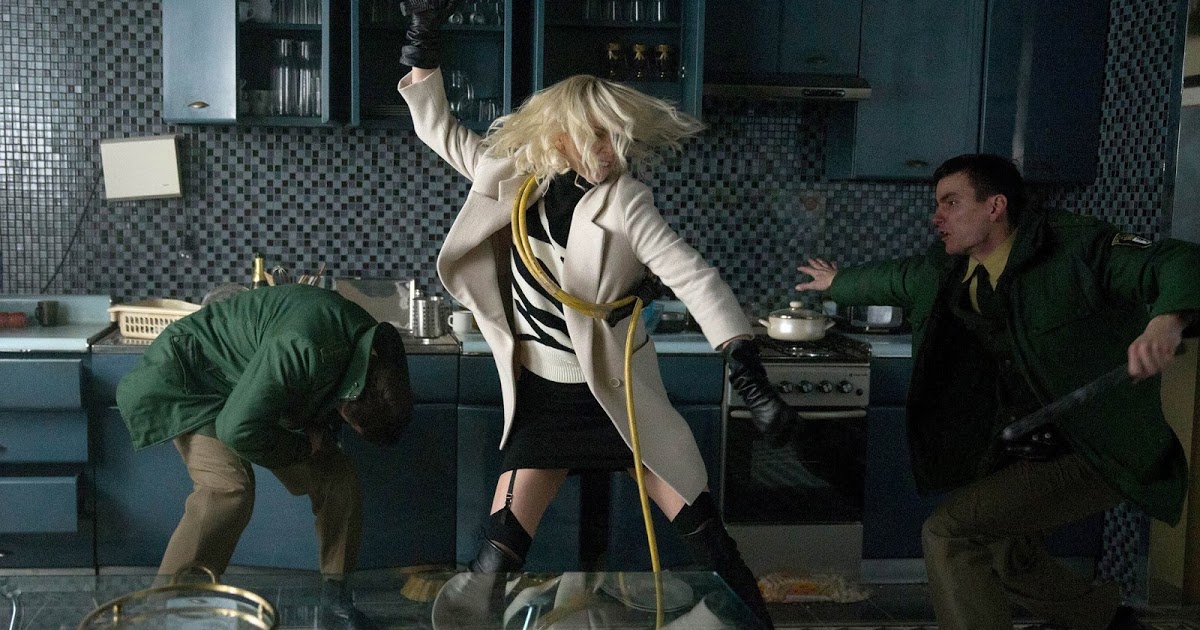
The scene in question sees Broughton escorting the defector, who has already been wounded. They take refuge in an apartment building only to be followed there by a bevy of Russian agents, whom she has to fend off with bullets, fists and even a convenient corkscrew. It’s nine minutes long, and appears to be shot in a single, unbroken take. Key word “appears” – if you look closely, you will likely be able to spot the moments where they cleverly blend the shots (about 20 or so, according to Leitch) together while the camera pans, tracks and zooms through the building. It’s still likely the most intense and hardcore battle in action heroine history, with the participants selling every blow impeccably. This is awesome, ground breaking stuff, and I haven’t enjoyed a scene so much since – again – Kill Bill, Volume 1.
For I’ve seen hard-hitting and inventively choreographed fights before. I’ve seen well-shot and technically impressive fights before. It’s the combination here which is almost unparalleled. Maybe the duel between Michelle Yeoh and Zhang Zi Yi in Crouching Tiger is the only one that comes close, though it had a very different kind of artistry, one that was based on grace and fluidity. [Outside our genre, I was additionally reminded of the car chase in Children of Men, which was apparently an inspiration] This is Lorraine Broughton, doing absolutely whatever she needs to survive, from second to second and moment to moment. It’s raw, animalistic and moves the bar for future action heroines to an entirely new level.
This is actually a problem, because it there’s still a good chunk of the film to go, and nothing the rest of the way comes close. As a result, there’s a sense of letdown from the adrenaline high, even if the final attempt of the Russians to kill Broughton is by no means bad. I’m hard pushed to find anything else of much significance to criticize here. We’ve got an Oscar-winning actress going full-on into the old ultraviolence? What’s not to love? Admittedly, the actual spy plot is a good deal less inventive and original than just about every other aspect here. But it’s merely a backdrop, the canvas on which Leitch and Theron paint their bloody masterpiece. Oh, and if you can’t get permission to use Ministry’s version of Stigmata, find something else. Do not use Marilyn Manson to cover it. He is not Al Jourgensen.
Otherwise, though, I should devote a full paragraph to the soundtrack, since it kicked ass, almost as much as Charlize. I’m a child of the eighties. It was the soundtrack to my teenage and college years, and I even spent some time in Berlin, on both side of the wall, in the middle of the decade. While that would be a couple of years before the events depicted here, it still brought back a heck of a lot of memories. Part of this might be the music, which plays like they rifled my CD collection. It starts with New Order’s Blue Monday, then segues into the opening credits which play out over David Bowie’s theme from Cat People, as Broughton stalks through the London streets. If not the first time that has been purloined for another movie – Quentin Tarantino used it, inexplicably, for World War 2 movie Inglourious Basterds – it works a lot better here. Consider me sold.
This is an action heroine in its most literal of terms. Broughton has often been compared to James Bond, yet she’s even more cool, detached and almost emotionless in some ways. It absolutely deserves a franchise, with its central character chewing her way through post-Cold War history like a shark in human form, always moving forward – and if you get in the way, it will end up the worse for you. Every step is absolutely purposeful and deliberate, a means to an end, and that end is her mission. Broughton does not fuck around, and neither does this film. Such single-minded determination can only be applauded.
Dir: David Leitch
Star: Charlize Theron, James McAvoy, Sofia Boutella, Toby Jones
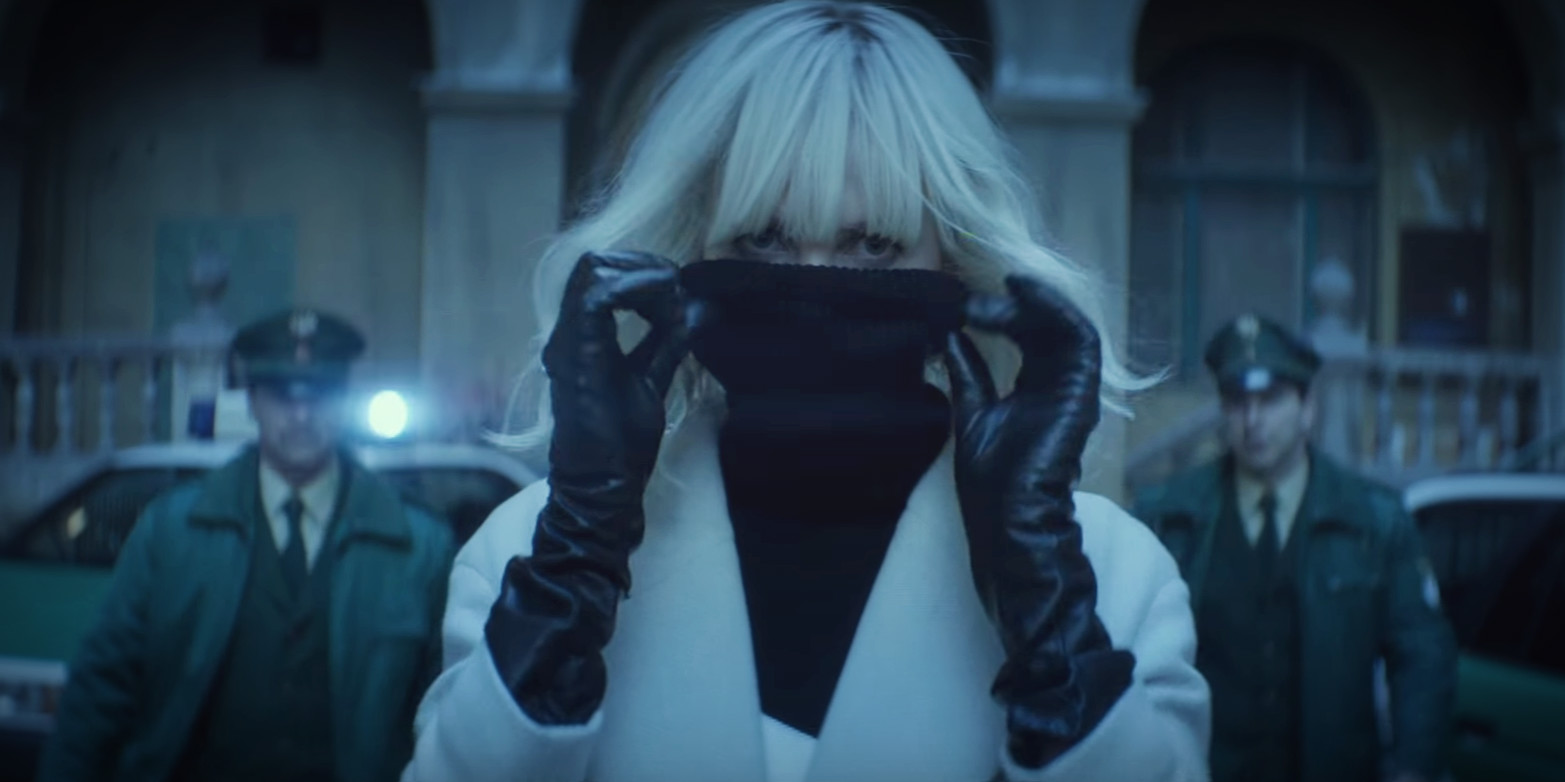
 A mission in central America against drug cartel boss Reynaldo Benitez (Garza) goes wrong, leaving eight Special Ops soldiers dead. This includes the husband of Naval Covert Operations Command agent, Abbey Vaughn (Gregory), who is intent on discovering the truth about what happened to her spouse. She links up with the only survivor of the operation, Lt. Sam Harrigan (Scarbrough), now living in a trailer, and spending his time drinking and practicing golf. Together with the rest of their team, they investigate the case, only to find the tentacles of organized crime are deeper embedded than they appear, and their inquiries put not only themselves, but Abbey’s family in serious danger.
A mission in central America against drug cartel boss Reynaldo Benitez (Garza) goes wrong, leaving eight Special Ops soldiers dead. This includes the husband of Naval Covert Operations Command agent, Abbey Vaughn (Gregory), who is intent on discovering the truth about what happened to her spouse. She links up with the only survivor of the operation, Lt. Sam Harrigan (Scarbrough), now living in a trailer, and spending his time drinking and practicing golf. Together with the rest of their team, they investigate the case, only to find the tentacles of organized crime are deeper embedded than they appear, and their inquiries put not only themselves, but Abbey’s family in serious danger.





 I say the above, since the father of the star here is Clint Eastwood, possibly the most famous vigilante in cinematic history. He gave us Dirty Harry, who memorably spat out lines such as, “When an adult male is chasing a female with intent to commit rape, I shoot the bastard – that’s my policy.” This apple doesn’t fall far from the tree. Though Noelle, the art student who becomes an avenging force after being raped at a party by a fellow student, takes a little longer to get to that point of unrepentant street justice. Her first victim is purely accidental, her attacker falling over a balcony after she confronts him, in the hope of getting some kind of apology. Doesn’t happen, and his death doesn’t exactly cause her sorrow. When she realizes she is also far from alone in what she has gone through, she decides that active retaliation is the best approach.
I say the above, since the father of the star here is Clint Eastwood, possibly the most famous vigilante in cinematic history. He gave us Dirty Harry, who memorably spat out lines such as, “When an adult male is chasing a female with intent to commit rape, I shoot the bastard – that’s my policy.” This apple doesn’t fall far from the tree. Though Noelle, the art student who becomes an avenging force after being raped at a party by a fellow student, takes a little longer to get to that point of unrepentant street justice. Her first victim is purely accidental, her attacker falling over a balcony after she confronts him, in the hope of getting some kind of apology. Doesn’t happen, and his death doesn’t exactly cause her sorrow. When she realizes she is also far from alone in what she has gone through, she decides that active retaliation is the best approach. If you ever wanted to see Denise Richards brawl with MMA star Chuck Liddell, or even the daughter of Frasier, this film delivers. For Richards plays FBI hostage negotiator, Gretchen Blair, who is being ignominiously sent back to Washington after willfully disobeying orders during a siege. She ends up sitting next to the increasingly-nervous Terry (Barker), who offers her $50 million if she helps him get off the plane alive. For he knows it’s about to be hijacked by Matthew Sharpe (Lundgren) and his cronies, who will stop at nothing to retrieve the item which Terry took from them. It’s up to Gretchen, with the dubious help of an air marshal on his third solo flight, to stop their plan.
If you ever wanted to see Denise Richards brawl with MMA star Chuck Liddell, or even the daughter of Frasier, this film delivers. For Richards plays FBI hostage negotiator, Gretchen Blair, who is being ignominiously sent back to Washington after willfully disobeying orders during a siege. She ends up sitting next to the increasingly-nervous Terry (Barker), who offers her $50 million if she helps him get off the plane alive. For he knows it’s about to be hijacked by Matthew Sharpe (Lundgren) and his cronies, who will stop at nothing to retrieve the item which Terry took from them. It’s up to Gretchen, with the dubious help of an air marshal on his third solo flight, to stop their plan.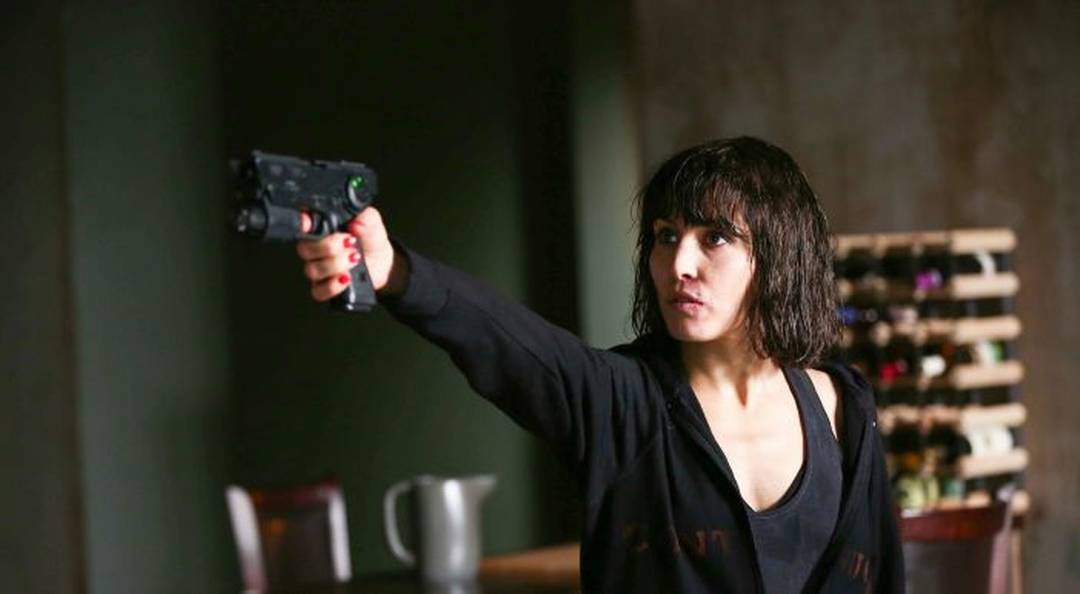
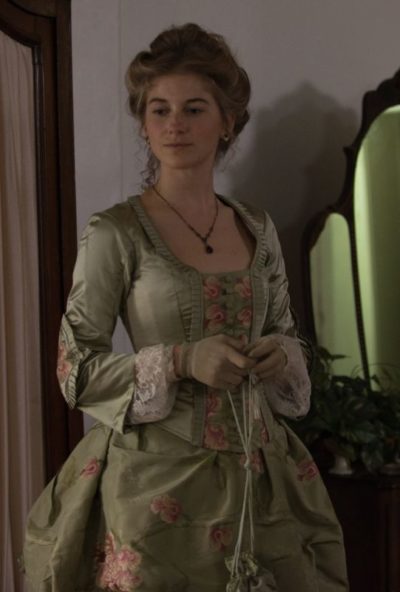 Game of Thrones, this clearly isn’t. But both Chris and I were struck by the similarities between what befalls the main character here, and the re-programming which Anya Stark underwent at the hands of the Faceless Men. Because the first, and arguably key, step in both is to destroy the existing personality, so there is a blank slate – the phrase “tabula rasa” is explicitly used here – on which the new character can be drawn. In this case, the victim is Isabel Porter (Gallerani), a young woman who has sunk into depression after the death of her parents. She opts for a stay at the Rosewood Institute, a highly regard mental sanatorium in Baltimore.
Game of Thrones, this clearly isn’t. But both Chris and I were struck by the similarities between what befalls the main character here, and the re-programming which Anya Stark underwent at the hands of the Faceless Men. Because the first, and arguably key, step in both is to destroy the existing personality, so there is a blank slate – the phrase “tabula rasa” is explicitly used here – on which the new character can be drawn. In this case, the victim is Isabel Porter (Gallerani), a young woman who has sunk into depression after the death of her parents. She opts for a stay at the Rosewood Institute, a highly regard mental sanatorium in Baltimore. There seems to have been a sudden surge of gynocentric takes on Taken (as it were), with first
There seems to have been a sudden surge of gynocentric takes on Taken (as it were), with first 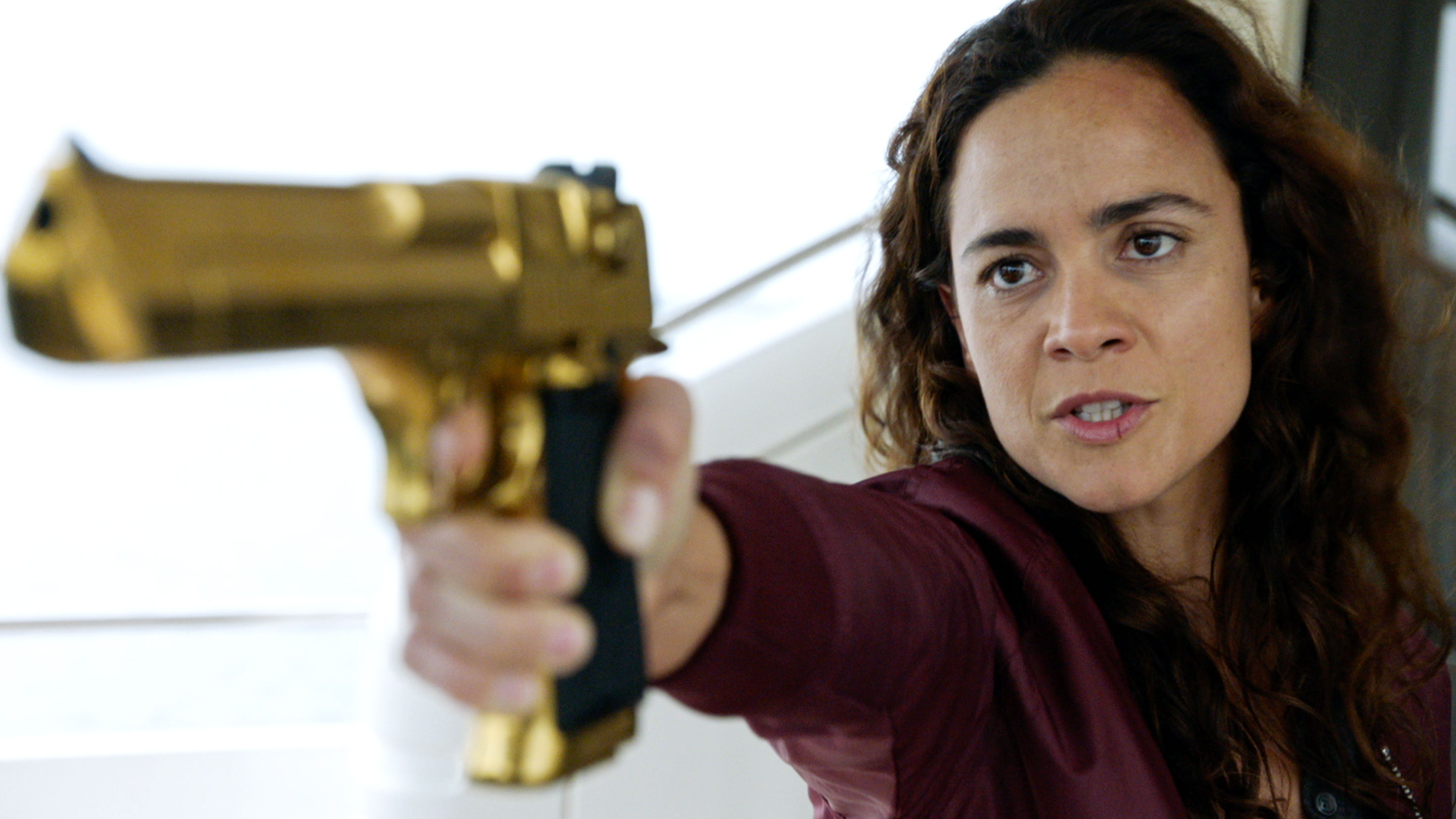 ★★★½
★★★½
 ★★★★½
★★★★½

 ★★★★
★★★★ This is a great deal of fun, striking a very impressive balance between the drama, comedy and – to my surprise – the wrestling elements. For the show does a particularly good job of explaining both the appeal of the sports entertainment in question, and the work that goes in to making it look good. Here, it probably helps that real wrestlers were involved: Chavo Guerrero was the main consultant, and his uncle, Mando Guerrero, helped train the original GLOW ladies in the eighties. Fans will also spot John Morrison/Johnny Mundo, Brodus Clay, Carlito and Joey Ryan in various roles. It’s not at all a parody of the sport; to a significant degree, the original GLOW felt like that. But it also does extremely well at linking the wrestlers and the characters they play, and showing how the latter evolve and develop out of the former.
This is a great deal of fun, striking a very impressive balance between the drama, comedy and – to my surprise – the wrestling elements. For the show does a particularly good job of explaining both the appeal of the sports entertainment in question, and the work that goes in to making it look good. Here, it probably helps that real wrestlers were involved: Chavo Guerrero was the main consultant, and his uncle, Mando Guerrero, helped train the original GLOW ladies in the eighties. Fans will also spot John Morrison/Johnny Mundo, Brodus Clay, Carlito and Joey Ryan in various roles. It’s not at all a parody of the sport; to a significant degree, the original GLOW felt like that. But it also does extremely well at linking the wrestlers and the characters they play, and showing how the latter evolve and develop out of the former. Stealing from both Open Water and
Stealing from both Open Water and